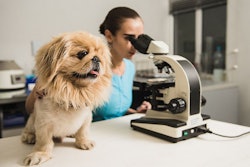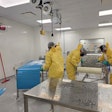DSM and CPF (Thailand) have signed an MOU to implement DSM’s recently launched sustainability service Sustell, the first of its kind, holistic animal protein sustainability service that measures and provides real data-based, independent guidance and solutions at the farm level for profitably improving the sustainability of animal protein production.
Royal DSM, a global purpose-led science-based company, has signed a Memorandum of Understanding (MoU) with CPF (Thailand) with an aim to measure and improve the environmental footprint of animal protein production through the use of DSM’s Intelligent Sustainability Service--Sustell. The MoU was signed today in Bangkok, Thailand.
Thailand plays an important role in livestock production and is the world’s fourth-largest poultry exporter.[1] With the population in Asia Pacific expected to grow over 5 billion by 2050[2], the demand for animal protein is also expected to increase rapidly, putting further strain on livestock production. The need to provide enough animal protein for a growing population, while reducing the environmental costs of farming requires smart science and innovative solutions. As part of DSM’s unwavering commitment to enhance sustainable animal nutrition and health DSM developed Sustell, the first of its kind intelligent sustainability service to improve farm-level environmental performance. It combines an advanced, powerful sustainability calculation tool that utilizes real farm data, with expert knowledge and tailor-made, practical solutions and business development projects to unlock the value of sustainability.
Welcoming the collaboration with CPF (Thailand), Justin Wang, regional vice president, DSM Animal Nutrition & Health, APAC & Greater China said “Asia’s rising demands for meat-based diets, fueled by the rapidly increasing population,[3] calls for charting a conscious path towards more sustainable animal protein production. At DSM, we are committed to help improve the sustainability of our food systems. We are proud to be the partner of choice of CPF (Thailand), the world’s largest animal feed producer and world leader in the production of poultry, swine and aquaculture protein, to help them improve the sustainability of animal farming. Together, we make it possible to achieve tangible, measurable improvements in the sustainability of animal farming and create brighter lives for all.”
Under the collaboration, DSM and CPF (Thailand) will team up to drive science based calculation and analysis of 19 environmental footprints using real feed and farm data. With Sustell, they will also look for opportunities of improvement and model the adoption of interventions to reduce the environmental footprints of animal farming. The collaboration underpins the sustainability agenda of both companies to significantly accelerate and future-proof sustainable animal protein production.
Prasit Boondoungprasert, CEO at CPF, said “With creating quality and safe foods at the heart of our operations, CPF (Thailand) is committed to balancing environmental and social development in order to serve every life on earth. Through this collaboration, we hope to enhance the entire value chain from farm to fork and advocate food security and self-sufficient society. I am sure with the help of DSM’s expertise we will be able to drive the animal farming sector towards sustainable growth.”
CPF (Thailand) stressed that the collaboration will help reduce its environmental footprint efficiently and drive the company towards sustainable business. Moreover, it will support CPF (Thailand) to develop innovative products that serve market demands on environmentally friendly manufacturing. This is the company’s strong commitment to create share value throughout the supply chain in line with our business strategy that focusing on nutrition, digitalization and technology.
DSM supports the livestock value chain through its strategic initiative ‘We Make It Possible’ and addresses the challenges facing the planet by improving lifetime performance of farm animals, reducing food loss and waste, reducing emissions from livestock, making efficient use of natural resources, reducing our reliance on marine resources and helping tackle antimicrobial resistance.














